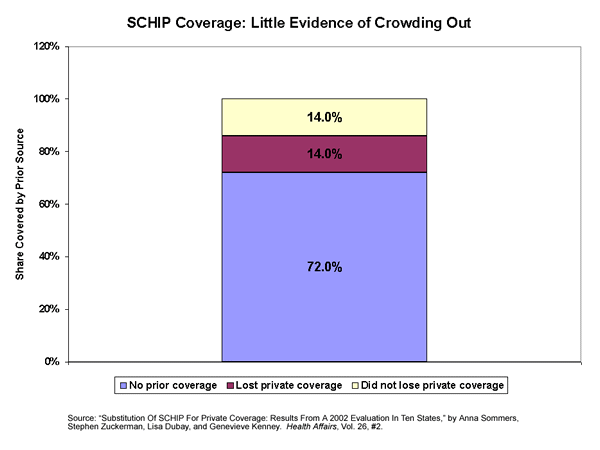See Snapshots archive.
Snapshot for September 12, 2007.
SCHIP is not eroding private health coverage
The Bush Administration is engaged in a concerted effort to reduce states’ ability to offer publicly provided health insurance coverage to children in families with incomes above 250% of poverty (about $50,000 for a family of four). These new restrictions are partly a reaction to certain states—like New York, New Jersey, California, and others—that planned to offer such insurance through SCHIP (State Child Health Insurance Program) to families with incomes up to 300-400% of the poverty threshold.
One of the Bush Administration’s main rationales for the roadblocks it is erecting to keep states from expanding coverage is that the administration wants to prevent children from moving directly from private employer-based coverage (through an employed parent) into SCHIP. But how valid is that concern? Is the availability of SCHIP encouraging employers to drop families from private coverage?
The figure below, from a recently published study by the Urban Institute (UI), shows that this is not the case. Most SCHIP enrollees (72%) were not covered by private coverage six months before enrollment in the public program. Another 14% lost coverage within a six month period prior to SCHIP enrollment, due to a lost job, an employer dropping coverage, or change in family structure that led to the child’s coverage being dropped (as in a divorce, separation, or death of covered spouse).

This leaves only 14% of SCHIP cases that substituted the public program for private coverage. But the Urban Institute’s study points out that more than half of these cases (8%) cited an inability to afford private coverage as the reason for shifting over to SCHIP. That is, the cost of the family premium through their job was prohibitively high.
The results of the study pose a stiff challenge for those who want to restrict SCHIP access based on the concern that public coverage is crowding out private coverage. The fact is that cost pressures and the lack of a public mandate (a requirement that employers cover workers) are leading to the unraveling of the employer-provided system. We need public insurance to pick up the slack, both for children and their parents.
